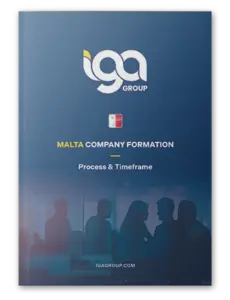Malta
Company Formation
Incorporating a company in Malta offers multiple benefits, making it an attractive choice for businesses looking to establish a presence in the European Union. Malta’s favourable tax regime, including the possibility of significantly reducing the effective corporate tax rate through shareholder refunds, is one of the key draws.
With a strong financial services sector, a skilled workforce and a range of government incentives for start-ups and innovation, Malta is an ideal hub for businesses seeking to operate on an international scale.
Finally, Malta provides access to the EU single market, a stable and transparent legal environment and is strategically located at the crossroads of Europe, Africa and the Middle East.
?
Why Malta
- Malta is a highly attractive jurisdiction for company formation, combining a competitive tax regime with the advantages of EU membership, such as access to the single market and robust regulatory protections.
- Its strategic location, bridging Europe, North Africa and the Middle East, as well as its extensive network of double taxation treaties make it a prime hub for international trade.
- Malta also boasts a stable business environment and a skilled, multilingual workforce, which are particularly advantageous for industries like financial services, gaming and technology. Start-ups enjoy tax incentives, funding opportunities and strong support for innovation.
Key Contacts
Alexia Panzavecchia
Claire Marie Calleja Zammit
Downloads
Useful Links
Key Information Overview
| Jurisdiction | Malta | |
| Types of Companies | Private Limited Liability Company (Ltd), Public Limited Liability Company (PLC), Holding Company, Branch, Sole Trader | |
| Minimum Share Capital | Ltd: €1,165.69 (20% paid up), PLC: €46,587.47 (25% paid up) | |
| Registered Office | Must have a registered office in Malta | |
| Shareholders & Directors | At least 1 shareholder, 1 director (at least one director must be a natural person) | |
| Bank Account | Not strictly necessary as share capital may be deposited via a CSP Operations Account or a ‘Company In Formation’ account. | |
| Tax Regime | Effective corporate tax rate as low as 5% due to shareholder refunds; standard rate is 35% | |
| Time to Complete Incorporation | 1-3 weeks | |
| Annual Maintenance Costs | Varies based on company size; includes annual registration fees, compliance costs and accounting fees | |
| Audit Requirements | Mandatory for companies exceeding specific turnover or asset thresholds | |
| Market Access | Access to the EU single market, strategic location between Europe, Africa and the Middle East | |
| Key Benefits | Favorable tax regime, strategic location, strong legal framework, skilled workforce | |
| Legal Framework | Based on both civil and common law traditions, strong investor protections | |
| Physical Presence Requirements | Registered office is required; physical presence otherwise not mandatory | |
| Corporate Governance Requirements | Must have a company secretary; directors' meetings and general meetings required as per Articles of Association | |
| Language Requirements | English and Maltese (all legal documentation can be in English) | |
| Tax Residency Rules | A company is considered a tax resident if managed and controlled in Malta | |
| Required Documents | Varies depending on the UBO or the shareholding company, but typically includes M&A, ID proof, registered office address and receipt for share capital. | |
| Compliance & Reporting | Annual returns, audited financial statements, VAT registration and regular tax filings | |
| Employee and Payroll Requirements | Must comply with Maltese employment laws, including social security contributions and payroll taxes |
Types of Companies
Malta offers various company structures tailored to suit businesses of all sizes, each providing distinct benefits based on your business model and objectives.
01
Private Limited Liability Company (Ltd)
- The most common type of company in Malta, suitable for SMEs and large corporations.
- Minimum share capital requirement: €1,165.69 (20% must be paid up).
- Can have a single shareholder.
02
Public Limited Liability Company (PLC)
- Suitable for larger businesses planning to raise capital from the public or list on a stock exchange.
- Minimum share capital requirement: €46,587.47 (25% must be paid up).
03
Holding Company
Often used to hold shares in other companies and benefit from Malta’s favourable tax regime for holding companies.
04
Branch of a Foreign Company
Allows foreign companies to establish a branch in Malta as an extension of the parent company.
05
Sole Trader
Ideal for individuals conducting business on their own, with fewer regulatory requirements but no limited liability protection.
06
Special Purpose Vehicles (SPVs)
SPVs in Malta are often used for specific financial, investment or corporate structures. Malta’s SPV regime benefits from EU compliance, strong financial sector support and tax efficiencies
Malta Holding Company
Offers tax exemptions on dividends from foreign entities and no withholding tax on dividends distributed to non-resident shareholders.
Securitisation Vehicle
Frequently used in financial markets to package assets and securities for investment, benefiting from Malta’s well-regulated financial system.
Investment Fund (AIF, UCITS)
Malta is a growing hub for Alternative Investment Funds. These vehicles benefit from EU passporting rights, allowing them to operate across Europe with ease.
Trusts and Foundations
Used for asset protection, estate planning and philanthropy, Malta’s trusts and foundations offer flexible management and strong confidentiality protections.
Start-Ups
Malta offers attractive incentives and favourable conditions for start-up companies, especially in the iGaming and technology sectors.

Tax Incentives:
- Corporate Tax Rate: While the standard corporate tax rate is 35%, shareholders can benefit from significant tax refunds on the distribution of dividends, effectively reducing the tax burden to around 5%-10%.
- Tax Credits: Start-ups may be eligible for tax credits, including the Micro Invest Scheme, which offers up to 45% tax credit on eligible expenses.
Government Grants and Subsidies:
- Start-Up Finance Scheme: Provides grants and soft loans for innovative start-ups.
- Seed Investment Scheme: Offers tax benefits to investors who purchase equity in start-ups.
R&D and Innovation Support:
- R&D Tax Credits: Generous tax credits for companies investing in research and development.
- Technology Development Programme: Grants to support innovative technology solutions.
Business Support Services:
Business Incubators: Various incubators and accelerators offer mentoring, office space and networking opportunities.
Employment Incentives:
Employment Aid Programme: Provides wage subsidies for employers hiring unemployed or inactive individuals.
Relocation and Visa Support:
Malta Residency and Visa Programme: Start-up founders and employees can benefit from easy access to the EU and Schengen Area.
Access to Markets and Networks:
Strategic Location: Access to both European and North African markets.
Digital and Innovation-Friendly Environment:
Blockchain Island: Malta is known for its favourable regulations for blockchain and cryptocurrency businesses.
A
Grade A: Highly Start-Up Friendly
Malta offers a solid environment for start-ups, especially in sectors like technology and iGaming. With generous tax incentives, government grants and support for innovation, it’s an attractive destination for entrepreneurs looking to establish or grow their businesses. The island’s focus on digital innovation, including blockchain and fintech, further enhances its appeal for forward-thinking investors.
Benefits
Incorporating a company in Malta provides numerous strategic advantages for businesses, from a supportive regulatory environment to access to key international markets.
Favourable Tax Regime
Malta has a corporate tax rate of 35% which can be reduced to as low as 5% through shareholder refunds. Double taxation treaties with over 70 countries provide relief from double taxation and participation exemption allows profits and dividends from foreign subsidiaries to be exempt from tax.
Business-Friendly Environment
Malta ranks highly in global indices for ease of doing business, with the government providing various incentives and grants to promote foreign investment. English is an official language, simplifying business operations and legal processes for international companies.
Skilled Workforce
Malta has a highly educated, multilingual workforce, making it easier for businesses to find qualified personnel.
Strategic Location
Located in the Mediterranean, Malta serves as a gateway to European, African and Middle Eastern markets, making it ideal for international trade and logistics.
EU Membership
As a member of the European Union, companies in Malta benefit from EU regulations, including access to the single market.
Requirements
To incorporate a company in Malta, several legal and administrative requirements must be fulfilled.
01
Shareholders
A Maltese company must have at least one shareholder, who can be either an individual or a corporate entity. There are no restrictions on nationality or residency.
02
Directors
At least one director is required, with no residency requirement. However, one of the directors must be a natural person.
03
Company Secretary
Every Maltese company must appoint a company secretary. The same individual cannot act as both the sole director and company secretary unless the company has a single shareholder.
04
Registered Office
The company must have a registered office in Malta, which serves as the official address for legal communications.
05
Minimum Share Capital
Private Limited Company: €1,165.69 (20% must be paid up); Public Limited Company: €46,587.47 (25% must be paid up).
06
Bank Account
The company must open a local bank account and deposit the share capital. A bank receipt is required to confirm the deposit during the incorporation process.
07
Tax Identification Number (TIN)
The company must obtain a TIN from the Maltese tax authorities for all tax filings and transactions.
08
Memorandum & Articles of Association
The company’s structure and objectives must be outlined in these documents, which are submitted to the Malta Business Registry during incorporation.
Mergers & Acquisitions
TAILORED SUPPORT to fast-track your market entry
Our Mergers & Acquisitions services are designed to assist clients in acquiring existing companies with pre-established licenses, streamlining the process of entering or expanding into key markets. These services are particularly relevant for investors seeking to fast-track their market entry while ensuring efficient and compliant solutions.
Identifying Suitable Businesses
We help clients locate companies that meet their specific goals, focusing on entities with strong operational histories and the required licenses.
Legal and Regulatory Assistance
Our experts guide clients through the unique legal and compliance frameworks of each market, ensuring a smooth acquisition process with minimal risk.
Valuation & Due Diligence
We conduct in-depth assessments of the target company’s financial and operational status, providing transparency and confidence in the acquisition.
Post-Acquisition Support
For clients who decide to divest, we offer comprehensive services to facilitate the sale of the company and transfer of licenses.
Frequently Asked Questions
What is the corporate tax rate for companies in Malta?
Malta’s corporate tax rate is 35%, but businesses can reduce the effective rate to as low as 5-10% through a shareholder refund system.
Are iGaming companies subject to VAT in Malta?
iGaming services are generally VAT-exempt in Malta, but other services related to gaming, such as marketing or hosting, may attract VAT.
What legal structures are available for companies in Malta?
Common structures include the Private Limited Company (Ltd) and Public Limited Company (PLC), both providing limited liability for shareholders.
Do Maltese companies need to have local directors or shareholders?
There are no specific requirements for directors or shareholders to be Maltese residents, though local presence can be advantageous for tax residency purposes.
Are Maltese companies required to file audited financial statements?
– Balance sheet total is 46 587,47 EUR;
– Aggregate goods turnover is 93 587,47 EUR;
– Average headcount of employees per period is 2.
What is the process for setting up a company in Malta?
The process includes preparing and filing the Memorandum and Articles of Association, opening a local bank account, and depositing the minimum share capital.
Is there a minimum share capital requirement for Maltese companies?
Yes, the minimum share capital for a Private Limited Company is €1,165.69, with at least 20% paid up at incorporation.
Does Malta have double taxation treaties?
Yes, Malta has an extensive network of over 70 double taxation treaties, which can help businesses avoid being taxed in multiple jurisdictions. Further information on Malta’s double taxation treaties may be found here.
What are the requirements for appointing a company secretary in Malta?
Every Maltese company must appoint a company secretary and this individual cannot also serve as the sole director unless the company has only one shareholder.
Are there any incentives for start-ups in Malta?
Yes, Malta offers several incentives, including tax credits, grants and support programs through entities such as Malta Enterprise and the Malta Development Bank.
Need assistance?
Whether you have queries, need further assistance or would like to request a quote for any of our services, please don’t hesitate to contact us.
Leave your phone number and we’ll make sure to call you back.



